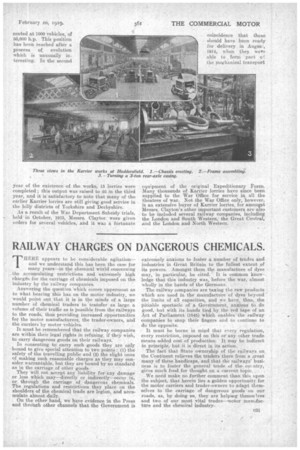RAILWAY CHARGES ON DANGEROUS CHEMICALS.
Page 11

If you've noticed an error in this article please click here to report it so we can fix it.
THERE appears to be considerable agitationand we understand this has been the case for many years-in the chemical world concerning the accumulating restrictions and extremely high charges for the carriage of chemicals imposed on the industry by the railway companies. Answering the question "which conies uppermost as to what bearing this has on the motor industry, we would point out that it is in the minds of a large number of chemical traders to transfer as large a volume of their traffic as is possible from the railways to the roads, thus providing increased opportunities for the motor manufacturers, the trader-owners, and the carriers by motor vehicles.
It must be remembered that the railway companies are within their legal rights in refusing, if they wish, to carry 'dangerous goods on their railways. In consenting to carry such goods they are only -bound to give special attention to two points: (1) the safety of the travelling public and (2) the slight onus of making such reasonable charges is they may consider warrantable, but they are bound by no Standard as in the carriage of other goods. They will not accept. any liability for any damage or loss which may-directly or indirectly-oecur, in, or through the carriage of dangerous chemicals. The regulations and restrictions they place on the shoulders of the chemical trade are legion, and accumulate almost daily. On the other hand, we have evidence in the Press and through other channels that the Government is extremely anxious to foster a number of trades and industries in Great .Britain to the fullest extent of its powers. Amongst them th,e manufacture of dyes may, in particular, be cited. MI's common know-. ledge that this industry was, before the war, almost wholly in the hands of the Germans. The railway companies are taxing the raw products which are Used in the manufacture of dyes beyond the limits of all canacitiei,. and we have, thus, the pitiable spectacle of a .Government, anxious to do good,' but with its hands tied by the red tape of an Act of Parliament (1845) which enables the railway companies to snap their fingers and to continue to de the opposite.
It must be borne in mind that every regulation, every restriction, imposed On this or' any other trade Means added cost of production. It may be indirect in principle, but it is direct in its action The fact that State ownership of the railways on the Continent relieves the traders there from a irreat. many of these handicaps, and that the railways' business is to foster the general trade of the.:.coi,ntry, gives much food for thought on a, current topic.
We need make no further comment than this upon the subject, that herein lies a golden opportunity for the motor carriers and trader-owners to adapt themselves to the carriage of dangerous goods on our roads, as, by doing so, they are helping theinsflves and two of our most vital trades-motor inannfactare and the chemical industry.






















